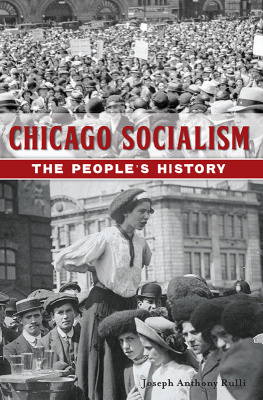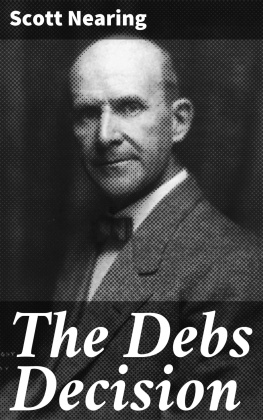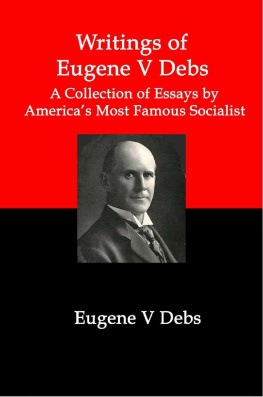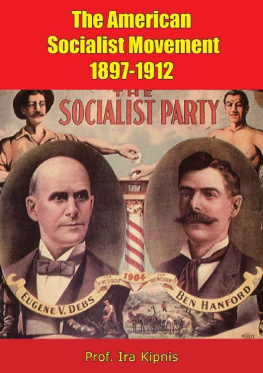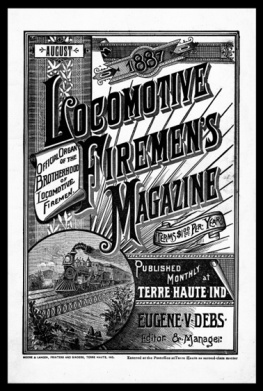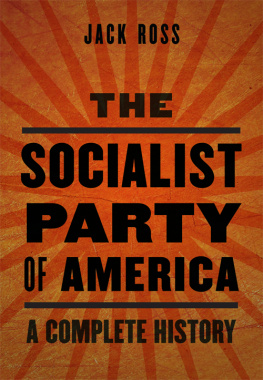
THE SELECTED WORKS OF EUGENE V. DEBS
This groundbreaking project by Haymarket Books will republish more than 1,000 of the articles, speeches, press statements, interviews, and open letters of labor leader and socialist activist Eugene Victor Debs. More than 1.5 million words will be reproduced in six thick volumesthe vast majority of which seeing print for the first time since the date of their first publication.
Eugene Victor Debs (18551926) was a trade union official, magazine editor, political opinion writer, and public orator widely regarded as one of the most important figures in the history of American socialism. Five times a candidate for president of the United States and twice imprisoned for his role as a strike leader and antiwar agitator, Debs remains today an esteemed and iconic figure of twentieth-century political history.
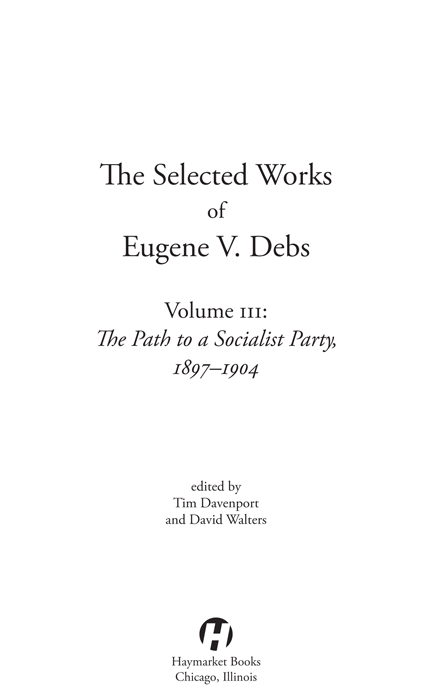
Published in 2021 by
Haymarket Books
P.O. Box 180165
Chicago, IL 60618
773-583-7884
www.haymarketbooks.org
ISBNs: 978-1-64259-180-4 (hardcover)
978-1-64259-032-6 (paperback)
978-1-64259-088-3 (ebook)
Trade distribution:
In the US, Consortium Book Sales and Distribution, www.cbsd.com
In Canada, Publishers Group Canada, www.pgcbooks.ca
In the UK, Turnaround Publisher Services, www.turnaround-uk.com
All other countries, Ingram Publisher Services International,
This book was published with the generous support of Lannan Foundation and Wallace Action Fund.
Cover and text design by Eric Kerl.
Library of Congress Cataloging-in-Publication data is available.

Introduction
This is the third of a six-volume series gathering the most important writings of American socialist and union organizer Eugene Victor Debs (18551926).
Volume 1: Building Solidarity on the Tracks, 18771892 followed the career path and intellectual development of a youthful Gene Debs, a boy who worked a year and a half as an unskilled engine maintenance worker before gaining promotion to the role of fireman for steam locomotives in the switchyard and aboard local trains. Attending business school during his free time, Debs dropped the scoop in 1874 to take a full-time job at a regional grocery wholesaler in Terre Haute, a large operation run by a family friend. Debs nevertheless managed to stay close to the railroad industry he loved as the founder and leading activist of Lodge No. 16 of the Brotherhood of Locomotive Firemen (B of LF) in February 1875.
Tireless work for the fledgling social benefit organization was rewarded in 1878 when young Gene was named assistant editor of Locomotive Firemens Magazine, the brotherhoods official monthly, followed by promotion to editor and election as national secretary-treasurer in 1880, a well-remunerated and prestigious job. Debs would remain a top functionary of the B of LF for nearly 15 years. In his role as a national labor magazine editorialist, Debs closely observed the world and labors place in it. Debss worldview gradually evolved from an early paternalistic emphasis on sobriety, clean living, the Protestant work ethic, and active self-improvement to a radicalized perspective marked by class struggle and a ceaseless battle of workers for adequate wages, better working conditions, and social respect.
The bitter defeat of striking engineers, firemen, and switchmen in a landmark 1888 strike against the Burlington railroad system played a pivotal role in Debss profound transformation. Seeing railroaders division into a dozen craft-based railroad brotherhoods as an insurmountable weakness when arrayed against the united front of railway owners and managers, in 1889 Debs sought to unite the existing organizations in a centralized federation known as the Supreme Council of the United Orders of Railway Employees. Debss hopes for this new structure were soon dashed, however, when the Supreme Council floundered and crashed in a bitter and dirty jurisdictional battle between two of its four affiliated member brotherhoods.convinced of the need for unity among railway workers, feeling that a fundamental change in the form of labor organization in the railway industry was necessary for enduring success.
Volume 2: The Rise and Fall of the American Railway Union, 18921896 saw Debs quickly gravitate to the idea of a new industrial union encompassing all railway workers, abandoning the established system of craft-based brotherhoods altogether. While the original idea for such an industrial union originated with former railroad conductor George W. Howard, founder of a militant dual conductors union, it was the charismatic Debs who rapidly became the top organizer and public face of the American Railway Union (ARU) from the time of its establishment in February 1893.
The ARU was fortunate to win a quick and widely publicized victory of an April 1894 strike against the Great Northern Railway via arbitration, but it came to grief the following year when delegates at the first and only quadrennial convention of the ARU voted to adopt an ongoing strike of railway-car assembly workers as their own. The unions boycott of trains attached to Pullman sleeper cars paralyzed much of Americas railway system for more than a week, from Chicago westward, before being crushed by the one-two punch of legal action by the aggrieved railways and military intervention by the federal government. Debs and a half dozen other top ARU officials were jailed without trial for contempt of court for having refused to immediately terminate the Pullman strike following judicial injunction. Decapitated, the union floundered; facing the blacklist, its members scattered. Despite the crushing defeat delivered to his union, the six months spent in county jail and his triumphant emergence as an unsullied hero of the working class would prove to be a seminal event in Debss life.
Upon his release in November 1895, Debsconvinced that lasting change was impossible through trade unionism aloneintensified his emphasis on politics, expanding his support of the independent third party politics of the fledgling Peoples Party (Populists). While this organization had real success in a number of western states, the movement proved short-lived, ultimately damaged beyond repair by the election of 1896 in which the Populists hitched their wagon to the candidacy of insurgent Democrat William Jennings Bryan. Resisting an effort by radical elements in the Peoples Party to draft him as an alternative candidate for president, Debs instead campaigned for the halfhearted reformer Bryan, speaking dozens of times to labor audiences around the country on behalf of the Democratic-Populist fusion ticket.
Bryans smashing defeat in November 1896 came as a severe blow to Debs and other earnest reformers. With the Populists discredited for their opportunism and the smallness of their intellectual horizons, the organization rapidly atrophied in size and influence. A new path was sought by those who sought fundamental economic change as a mechanism for building a better world.

Home for Christmas 1896 from his relentless fall tour in support of the Bryan fusion ticket, Gene Debs found a surprise visitor to his Terre Haute homeEdward Boyce, Boyce had a favor to ask of the ARU leader. A lengthy strike was underway in the booming mining town of Leadville, Coloradoa place where Boyce had himself toiled in the mines for four years previously. Wild fluctuations of the American economy had been the source of the trouble, with a partial recovery after the Panic of 1893 giving way to a new downturn in 1896. Unemployment escalated, and commodity prices, including those for silver and other metals, fell precipitously. Colorado mine operators used the bad economy and their weak bottom line as a pretext to cut wages, slashing the basic daily rate for a Leadville miner from $3 a day to $2.50. Feeling themselves unable to live on the reduced daily rate in the comparatively costly community of Leadville, then the second largest city in Colorado after Denver, miners had struck for a return to the former pay scale. The mine operators would not budge, and suspicions were rife that this intransigence was a mere pretext for an ulterior motive: busting the union. A massive strike had erupted, lasting for months. Boyce had come to Debs to ask for his help as a union activist and public orator in helping to bring the costly and violent Leadville strike to a reasonable conclusion. Debs promised his help early in the coming year.



